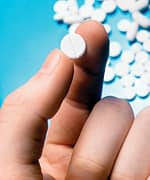- Science & Research
- Science News
- Newsletter
- 2014
- August 19

Newsletter
Newsletter
Aspirin May Help Delay Breast Cancer Recurrence
Aspirin may help delay breast cancer recurrence |
|||
Tuesday, August 19, 2014. An article appearing in the journal Cancer Research on August 14, 2014 reveals a protective effect for aspirin and other nonsteroidal anti-inflammatories against the recurrence of breast cancer in postmenopausal overweight women. "Obesity is associated with a worse breast cancer prognosis and elevated levels of inflammation, including greater cyclooxygenase-2 (COX-2) expression and activity in adipose-infiltrating macrophages," write Linda deGraffenried, PhD, and her associates at the University of Texas. "The product of this enzyme, the pro-inflammatory eicosanoid prostaglandin E2 (PGE2), stimulates adipose tissue aromatase expression and subsequent estrogen production, which could promote breast cancer progression. This study demonstrates that daily use of a nonsteroidal anti-inflammatory drug (NSAID), which inhibits COX-2 activity, is associated with reduced estrogen receptor alpha positive breast cancer recurrence in obese and overweight women." For their study, Dr deGraffenried's team reviewed medical records from 1987 to 2011 of 440 predominantly overweight or obese postmenopausal women diagnosed with invasive estrogen receptor alpha-positive breast cancer. NSAID users were found to have a rate of breast cancer recurrence that was half that of nonusers of the drugs. Nonusers remained free of breast cancer for a 50.6 month average, in contrast with an average of 78.5 months among women who used NSAIDs. After adjustment for NSAID use and hormone therapy, being overweight or obese was associated with an 86% higher risk of recurrence in comparison with having a normal weight. "Overweight or obese women diagnosed with breast cancer are facing a worse prognosis than normal-weight women," stated Dr deGraffenried, who is an adjunct assistant professor in the Department of Cellular and Structural Biology at the University of Texas Health Science Center. "We believe that obese women are facing a different disease. There are changes at the molecular level. We want to reduce the disease-promoting effects of obesity." "We would like to identify which women are most likely to benefit from interventions like adding NSAIDs to treatment regimens," she added. |
|||
| What's Hot | |||||
| Low dose aspirin use associated with pancreatic cancer risk reduction | |||||
Utilizing data from 362 men and women with pancreatic cancer matched to 690 control subjects enrolled in the Connecticut Pancreas Cancer Case-Control Study, researchers at Yale University determined that regular use of aspirin was associated with a 48% lower risk of cancer of the pancreas in comparison with non-use. Each increasing year of regular aspirin use was associated with a 2% lower risk of the disease and each year of low dose use with a 6% lower risk. "We found that the use of low dose aspirin was associated with cutting the risk of pancreatic cancer in half, with some evidence that the longer low dose aspirin was used, the lower the risk," reported lead researcher Harvey A. Risch, MD, PhD, who is professor of epidemiology in the Department of Chronic Disease Epidemiology at the Yale School of Public Health. "Because about one in 60 adults will get pancreatic cancer and the five-year survival rate is less than 5 percent, it is crucial to find ways to prevent this disease." "Older studies of aspirin use have been clouded by the use of [regular- or high-dose] aspirin for pain relief from conditions that themselves might be related to the risk for pancreatic cancer," he noted. "Only recently have people been using low-dose aspirin for long enough times that the use might bear on risk of pancreatic cancer development." "There seems to be enough evidence that people who are considering aspirin use to reduce the risk for cardiovascular disease can feel positive that their use might also lower their risk for pancreatic cancer, and quite certainly wouldn't raise it," he added. |
|||||
Life Extension Clinical Research Update The Life Extension Foundation® is sponsoring a study to measure the effects of weekly injections of a study medication plus nutritional supplements that may help suppress an inflammatory factor implicated in the neuronal degeneration of Alzheimer's disease. If you or someone you know:
Qualified participants receive:
$200 Referral Bonus if study requirements are met. Make a Call. Make a Difference! Please call the office of Mark Brody, MD, 1-561-374-8461 Or you may pre-register Call For Details: 1-866-517-4536 https://www.lifeextension.com/clinicalresearch/ClinicalTrials.htm |
||||||
Health Concern
Estrogen is a growth factor for most breast cancers. High-fat diets and associated increases in fat tissue can increase estrogen availability in a number of ways:
|
||||||
| Latest Products | |||||
 |
Advanced Triple Peptide Serum, 1 ounce Item #80152 |
||||
Peptides are the natural choice for restoring damaged, aging skin. Research has now pinpointed three peptides with particularly potent effects. The result is a softer, smoother, more radiant youthful-looking skin. Acetyl hexapeptide-5: This novel peptide combats wrinkle formation by supporting the skin's natural DNA repair capacity. Acetyl tetrapeptide-2: The effective peptide known as acetyl tetrapeptide-2 has been shown to rejuvenate facial skin, improve skin tone and texture—and help defend against the visible signs of skin aging. Palmitoyl tripeptide-5: Researchers demonstrated this peptide decreased the appearance of fine wrinkles by 20% and coarse wrinkles by 28%—and these results were observed within 15 minutes. |
|||||
 |
Migra-Mag with Brain Shield®, 90 vegetarian capsules Item #01800 |
||||
Studies have confirmed the effectiveness of the ingredients found in the new Migra-Mag with Brain Shield® in targeting the key, underlying factors resulting in head-cavity discomfort. Working through different yet functionally supportive mechanisms, the individual ingredients in Migra-Mag with Brain Shield® have been shown to:
|
|||||
| Related Life Extension® Magazine Articles | |||
| The Everyday Drug That Prevents Cancer Death |
Report: Aspirin | ||
 |
 |
||
The latest news on aging, nutrition, and vitamins
Lab
Testing
How Life Extension lab testing works



